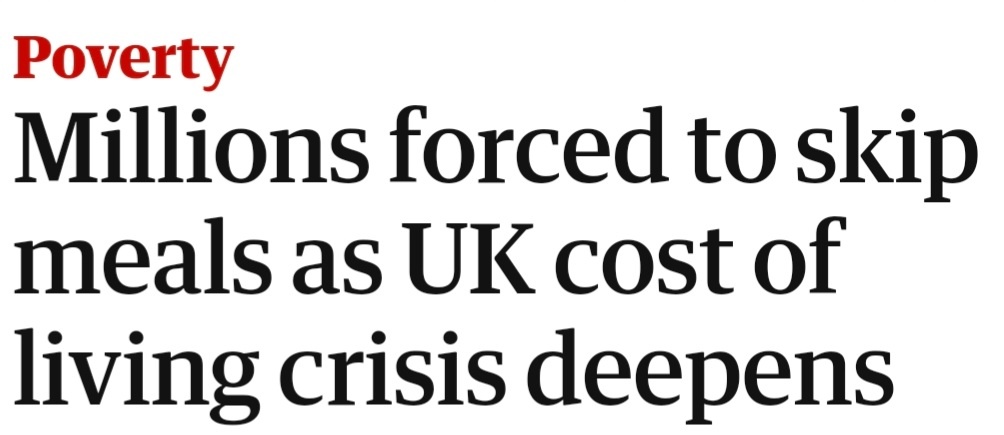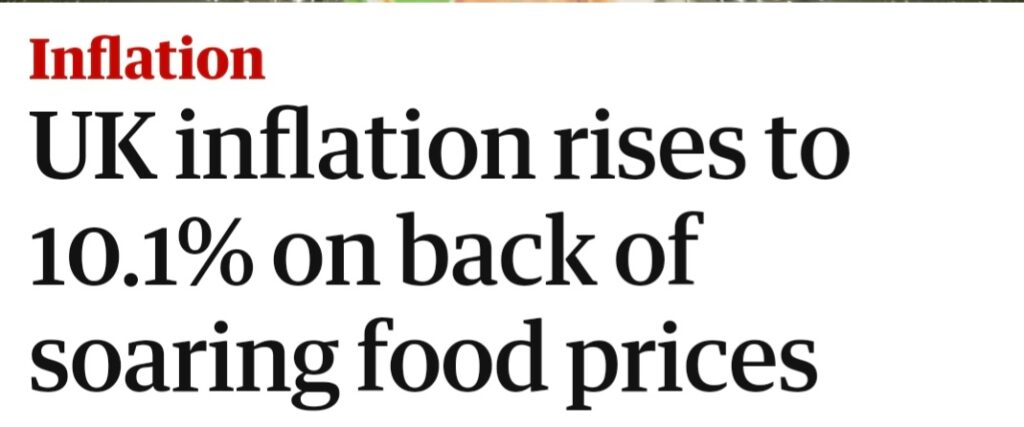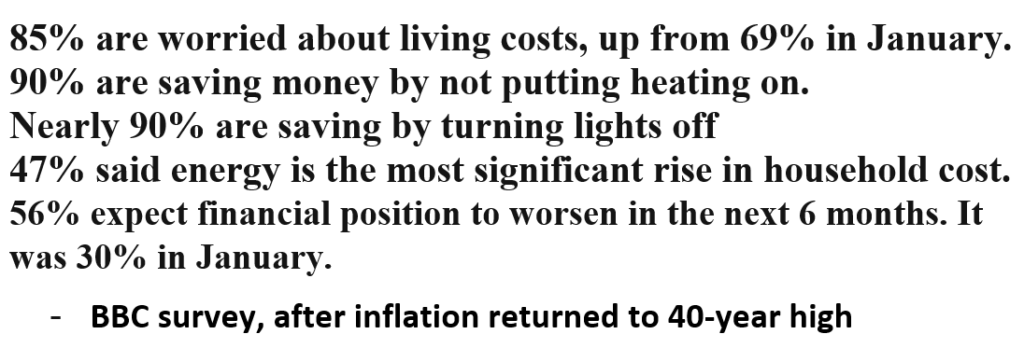The chances of an early general election are increasing almost by the day. Liz Truss has seen her flagship economic policies – those on which she was elected Tory leader – trashed by Chancellor Jeremy Hunt, who is the fourth Chancellor this year and effectively de facto Prime Minister. Even Tory MPs understand that it is an untenable situation in the long run.
Former Tory Chancellor, George Osborne, describes Truss as “PINO”, or “prime minister in name only”. How can she not resign, one senior Tory asked, “when her entire argument for the future of the country has been totally shredded?” (Financial Times, October 17). Another, an MP who backed Truss for the leadership, said, “It would be mad if she doesn’t go.”
In another article in the Financial Times, Tory peer Stuart Rose, former M&S boss and currently chair of Asda, said that Truss had lost the confidence of business and investors. “She is a busted flush,” he told the FT. “As prime minister, you have to have the confidence of business, investors, the electorate and colleagues in the party. She has none of these.”
The editorial writers of the FT have written, “Good riddance to Trussonomics” and have called for a general election. “The question,” one Tory minister told the paper, “is when — not if — she goes,” (October 16)
Tory MPs reluctant to go back to “the loonies in Maidstone”
Liz Truss is still Prime Minister, but only because Tory MPs cannot think of a way to get rid of her. They do not want another ballot of Party members, handing it back to “the loonies in Maidstone”, as one Tory MP put it. Tory MPs are in a state of open mutiny, humiliated (and some amused) by the loud laughter in the House of Commons that greeted Penny Mordaunt, denying that the Prime Minister was “hiding under a desk”.

The impasse in which the Tory government now finds itself has concentrated the minds of many Tory MPs. Many are already touting their friends and contacts in business and the City to find alternative employment, with the strong possibility that they will soon lose their seats. A large proportion of Tory MPs already have lucrative second or third jobs and most of them will have no difficulty finding work in business or finance.
Such is the mood of doom and resignation among these MPs that the political crisis could gather a momentum of its own, leading to a general election sooner rather than later. It would only take a few dozen Tory MPs to shrug their shoulders and vote the ‘wrong’ way on a no-confidence motion, for an election to be triggered.
As long as the Tories remain in office, they will stagger from one crisis to another, whether that is under Truss or another leader. It is clear that a section of the ruling class and its political strategists are already planning for a Labour government – with Keir Starmer and Rachel Reeves as a ‘safe pair of hands’ – to pick up the poison chalice laced with recession, chaos and economic collapse.
Most successful right-wing political party in Europe
The calamitous position of the government is a crucial turning point, but not just for one political party. It is at root an insoluble quandary for British capitalism. The Conservative Party has been the main political representative of the British ruling class for two centuries and in that time it has been the most successful right-wing party in Europe, the ‘natural party of government’ for the capitalist class. British capitalism has all but lost control of its chosen party.

We have just had a chancellor who lasted only 38 days – the shortest in 200 years, not counting one who died in office – and one who had his keynote policies overturned in only three weeks. Any replacement for Truss would be the fifth Tory Prime Minister in six years. It is an indication of the splits, indecision and total lack of confidence within the ruling class that ‘their’ party is now in such utter disarray and is riven from top to bottom.
Whatever Truss may have said about there being ‘no cuts’, Jeremy Hunt is set to launch the harshest raft of austerity policies since George Osborne’s in 2010, with this difference, that this time they will be resisted far more fiercely than they were twelve years ago.
The death throes of the Tory government might be played out on TV footage from the House of Commons, but the real struggle over policy, living standards and workers’ rights will be fought on the streets and in the workplaces, not on the famous green leather benches.
Millions of workers are already engaged in industrial actions in defence of living standards or they are about to conduct ballots for strikes. One has to go back to the 1970s to see so many workers involved in balloting or in strikes and picketing, except that now there is a wider range of workers involved than there were fifty years ago.
Yet into this scenario, Jeremy Hunt is injecting more austerity. He is about to pour petrol onto an inferno. There is little public support for more cuts. According to the Financial Times (October 18), “In 2010, only 31 per cent of the British public were in favour of higher taxes to spend more on health, education and social benefits. In 2021, that figure was 52 per cent”.
Public services, including health, social care, education, and local government, are already on their knees and there is no ‘fat’ to be cut from the bone. Capital spending on healthcare is already much lower in the UK than similar OECD countries, according to the Health Foundation. Public sector take-home pay in the last twelve years has fallen well behind inflation and across the board there are massive job vacancies.
“Very difficult decisions” to be made – Jeremy Hunt
Yet, Hunt told ITV, some “very difficult decisions both on spending and on tax” are going to have to be made. These will be announced in the “medium-term fiscal plan” – in effect, a full budget – on October 31.

Hunt is preparing the ground for big cuts right across government departments. Nurses, NHS workers, teachers, fire-fighters and all public sector workers will be expected to bear the brunt of savings, and we can expect the usual “we’re all in this together” lie to be trotted out.
As well as new cuts in public spending, Hunt is doing away with the (very limited) freeze on energy costs, so gas and electricity prices will soar even further next April. A typical home, it is estimated, will pay £4000 for energy – £80 a week. Already, families are unable to afford to keep themselves warm in winter and cannot afford to cook, but millions more will be pushed into energy poverty. Those who depend on welfare benefits will find that payments will lag well behind prices.
It is doubly and trebly important, therefore, for the TUC, meeting this week, to coordinate the actions of all trade unions involved in struggles to get decent wage rises, at the very least on a par with increased prices. These unions have the support of other workers, most Labour members, and the sympathies of most of the general public. There is no doubting the determination of workers to fight for their living standards; the key issue is whether their leaders can show the same boldness and determination.
The Labour Party is right to demand a general election immediately. Truss and Hunt have no mandate. Labour members and supporters hope for an end to this government and for the election of a Labour government. And if that happens – and it looks likely, whenever the election comes – it would be because of the complete collapse of credibility and support for a corrupt and rotten government. Labour would get a victory despite Keir Starmer and his Shadow Cabinet team, not because of them, but just as Labour won thirteen million votes in 1997, they are on course to win as many again.
The markets rode roughshod over a Tory chancellor
But the chaos of the Tory government also carries a serious warning. Labour Party members should note the ease with which the ‘markets’ rode roughshod over a Chancellor and Prime Minister. If this is what happens with a Tory government, imagine what would happen if a Labour government attempted to carry through measures in the interests of working class people.

The few promises and commitments made by the Labour leadership that are in the interests of workers are relatively modest, but even these will be put in jeopardy by the incessant pressure, from day one, from the Bank of England, the ‘markets’ – the vanishingly small proportion of the population who make money by manipulating bond and share prices – and business in general.
Reeves and Starmer will be under pressure to ‘postpone’ or ditch any genuine reforms for the ‘duration’ of the crisis. It will be the task of the rank and file of the Labour and trade union movement to counter that pressure with their own demands.
The strength of the working class lies in the workplaces and in communities. It is not enough to put an ‘X’ on a piece of paper every few years. The implementation of political policy in the interests of the working class will ultimately depend not on a majority in parliament, but on the willingness and organisational capacity of workers to engage in struggles outside of that place.
Whether under a Truss or a Starmer government, workers should demand:
- No more cuts in living standards.
- Wage rises linked to the cost of living
- No cuts in local government services, education, or the NHS.
- Restore the public spending cuts from 2010.
- Public ownership of the energy companies and all public utilities and the freezing of all energy prices at 2021 levels.
- Socialist policies for a democratic planned economy in the interests of the many not the few
The UK is still the fifth or sixth richest country on the planet; there is no reason why all the basic necessities of life: food, clothing, housing, energy, employment, education and health services, could not be provided for everyone. The only thing that stands in the way of these rights is a system based on greed and profit for a tiny minority. It is a system well past its useful life.



